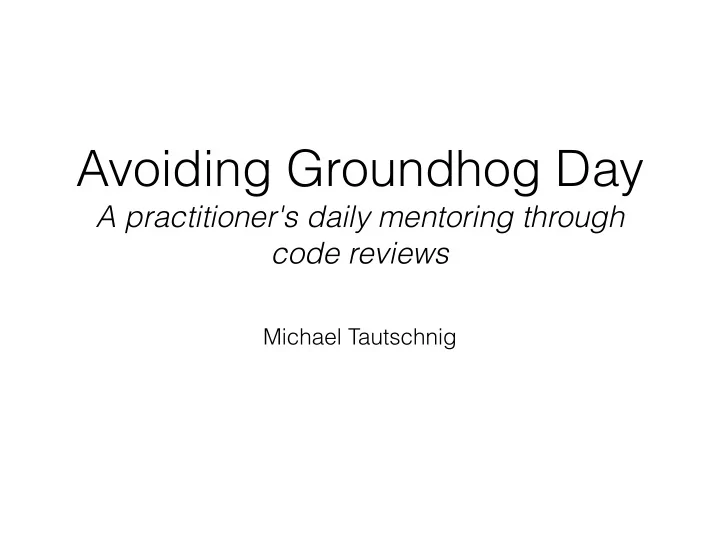

Avoiding Groundhog Day A practitioner's daily mentoring through code reviews Michael Tautschnig
Caveats 1. This is my area of practice, not research. 2. My academic background is formal verification.
What I thought: Code review is a quality-assurance step. (And I thought: it's a poor quality-assurance step.)
https://en.wikipedia.org/wiki/Code_review
Over the last 28 months I have ... • Submitted > 260 + 324 pull requests for review. • Received > 1600 + 1090 pull requests for review. • Commented on 500? + 549 pull requests. • Learnt that code review is 1) more useful than I thought and 2) useful in a very different way.
What I learned: Code review is a communication tool.
https://medium.com/@Andela/whats-the-real-essence-of-code-review-a5867109a1e1
Why Pull Requests? • Synchronisation point • What changes? • Why does it change? • How does the code change? • Enables review with limited context
The ideal PR+CR Process • React quickly, both with reviews and replies / refinements: Preserve momentum, minimise human context switches • Involve stake-holders and domain experts, spread load • Ping people if necessary • Help reviewers decide whether your change is good • Clean code • Good description • Demonstrate soundness (simple is better, testing) • Be respectful of reviewers' time → make it easy
Good PR Patterns • Small, incremental changes: One PR per feature • Break up long PRs • Clean-ups (whitespace, typos, coding style) • Refactoring changes • Functional changes https://dev.to/bosepchuk/optimal-pull-request-size-600 • (Almost) no too small CR • Preserve bisectability: each commit should compile and run • Sensible testing → context-free judgment of correctness • Early idea → Mark PR as RFC • Good commit messages
Good Commit Messages • Good description http://chris.beams.io/posts/git-commit/ • Meant for eternity, read-mostly (optimise for that) • Expression, grammar, spelling, capitalisation • Why & what in message, how in diff • Linux-style git workflow, chain-of-custody tags https://www.kernel.org/doc/Documentation/ SubmittingPatches
Why code review? https://medium.com/@Andela/whats-the-real-essence-of-code-review-a5867109a1e1 • To facilitate knowledge sharing across the code base and across the team. • To ensure maintainability of code — hence the project, especially when a team member has to leave the project. • To learn new technologies and techniques , as we’re never always on the same level of knowledge with all of our teammates. • To reduce code smells .
... and to avoid Groundhog Day
Code review is educating
http://softwareandotherthings.blogspot.ie/2015/08/make-your-code-reviews-agile.html
Code review is architecting
Code review is learning
http://dilbert.com/strip/2013-02-24
• Code review is communication • Opportunity for learning, education, knowledge sharing • I still think code review alone is an insufficient quality-assurance mechanism. • Could someone please fix the Wikipedia page?
Recommend
More recommend